Electrical Vehicle (EV) Charger Installation
Licensed Electrician
I handle home EV charger installs. I install Tesla, ChargePoint, Emporia, Ford, and other chargers in the West Suburbs of Chicago. Owner supplied units are accepted. All installations have panel load calculations performed and are code-compliant - no shortcuts, no concerns.
I am a one-man shop, and as such your quality is guaranteed personally, by the owner, with direct service from the owner and no additional employees. For every job, I hang my name and reputation on the work I do, and I always strive to leave every customer fully satisfied at the end of the day. Furthermore, I am a fully trained licensed electrician, certified, insured, and bonded.
All of my work comes with a satisfaction guarantee and ten-year warranty.
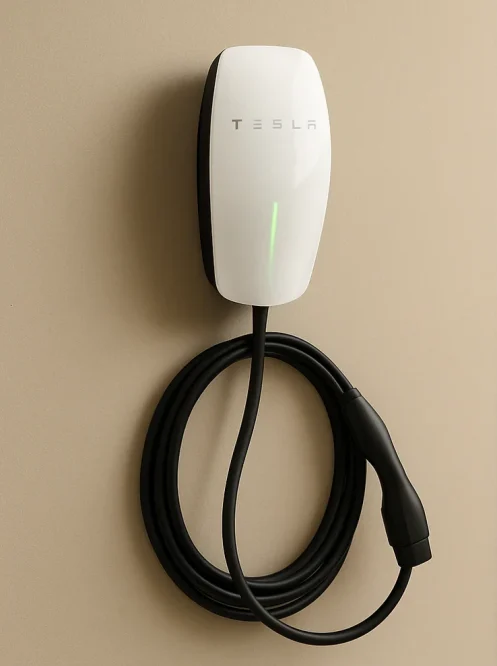
Level 2 Charging Station Installation
EV level 2 charger installations can radically improve your home charging time, whether it's a Tesla charging station or universal brand. I can also install a 50A 240V receptacle outlet if you prefer a mobile connector.
Code Compliance
All of my installations will meet or exceed current NEC requirements, as well as municipal amendments.
All outlets will be provided with GFCI protection.
Permits
As a licensed professional, I can pull a permit for your new charger in any city in Illinois.
Load Calculations
Every installation comes with a panel load calculation included for free. I make sure your home's electrical system can handle the large additional load and select the appropriate charge rate.
Clean Worksite
Your home will be left as tidy as it was found. I always clean up drywall dust, copper, and other debris before completion.
Certified & Insured EV Installer
I am certified by the state of Illinois Commerce Commission as an EV installer, which is shared with ComEd for its residential customer rebate program.
In addition, I am a certified contractor with the City of Naperville, a requirement for their municipal rebate program.
I have a $1M/$2M liability policy through Farmers, and bonding with each municipality.
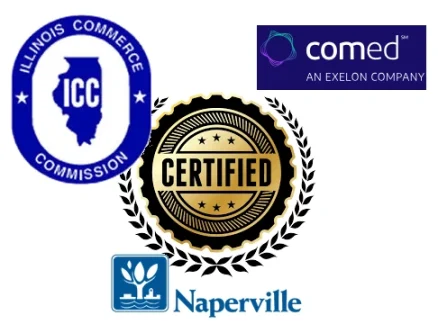
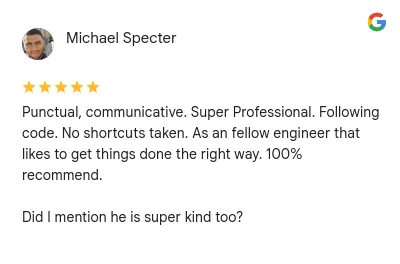
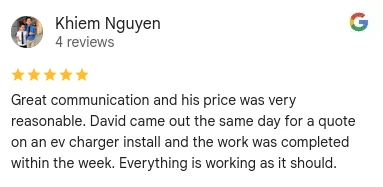
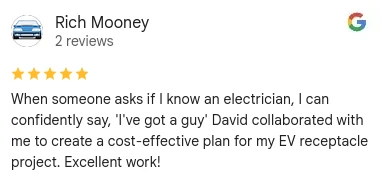
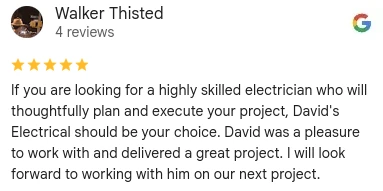
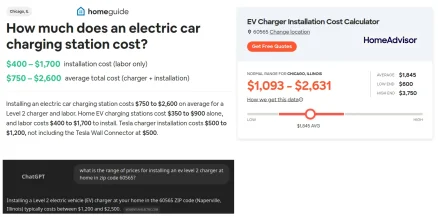
Cost Breakdown
The short answer is that over the past year, my home EV charger install costs (minus the charging unit) have averaged around $1300, with a typical range from $1000 to $1800, excluding the charger itself. Occasionally, costs can be significantly higher; typical if a subpanel install, underground wiring, or very long distance from the panel is involved.
The cheapest installs will be situations where the charger is installed directly adjacent to the panel, while the most expensive will be where wiring must be run dozens of feet through drywall ceilings in a basement and fished through wall partitions to reach the desired charger location. Major factors are:
- The Distance between the Panel and Charger
- The Ceiling Type (unfinished, drop tiles, drywall) and Wall Type between the Panel and Charger
- Overall Complexity of Framing (in walls/ceilings/spaces I need to traverse with wiring)
EV Outlet Install
If you want to use a mobile charger or plug-in wall charger, you will need an outlet installed. The standard outlet is the 14-50R, the typical 50 amp outlet for homes. The wiring from the panel is generally the same (and most of the cost), so a receptacle outlet can usually be changed to a hardwired unit down the road for much less than a full installation.
In addition, there is a new "EV rated" standard being put into place, after certain manufacturers found their standard 14-50R outlets were insufficient for EV loads. These tend to be much pricier, but I am now installing them by default, and they will be required when municipalities upgrade to the 2026 code cycle.
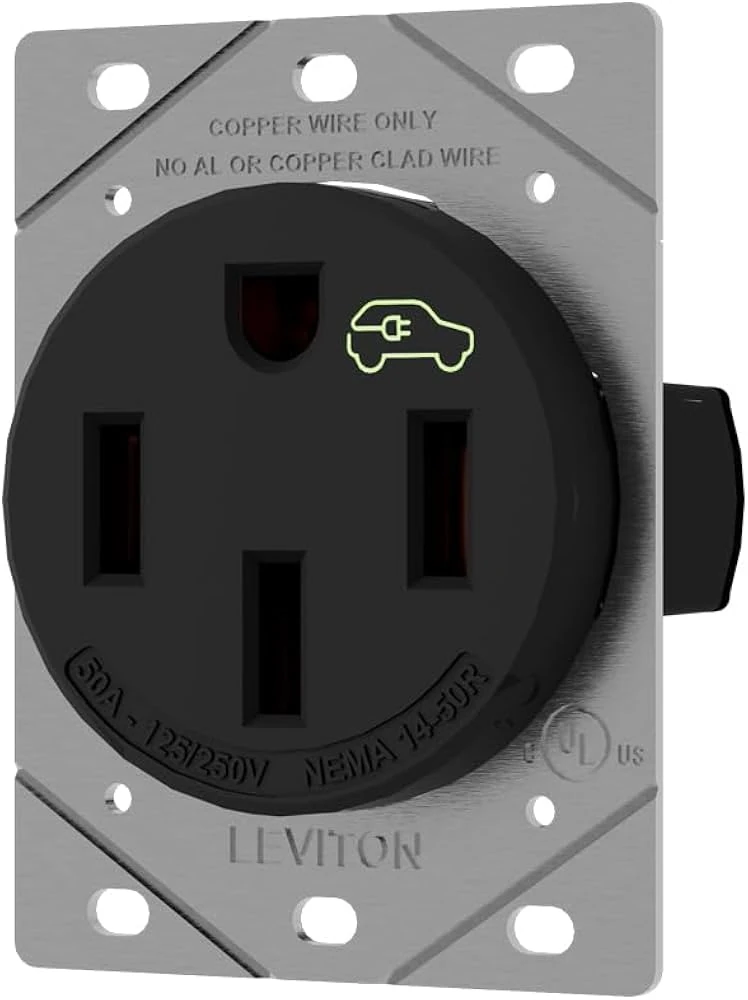
Charger Rebate Offers
I can assist you in finding rebates for your EV charger install, which can offset a large portion of the total cost. Residents of Naperville are eligible to receive up to a $500 credit for an EV charger install through the city's power company, but this requires using a registered contractor such as myself and having me pull a permit for the job (always recommended regardless). Some residents of Naperville are also eligible for a further $1000 tax credit from the IRS.
ComEd customers, such as those in Lisle and Downers Grove, may be eligble for up to $3750 in credit if income-eligible, or $1000 otherwise.
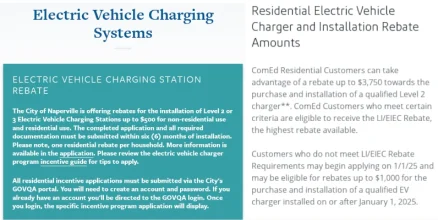

Level 1 vs Level 2 Charging Stations
Level 1 charging stations plug in to a standard wall receptacle. These are heavily limited in the amount of energy they can use, generally no more than 12-16A continuously at 120V. This is generally insufficient for anything more than very light, local driving.
Level 2 charging stations are either hardwired to your panel or plug in to heavier duty receptacles, such as the standard 50A NEMA, and utilize a power-doubling 240V circuit. So not only is the amperage greatly increased versus a Level 1 plug, but also that amperage's power is doubled by heading up to 240V. Even if your panel cannot permit a full 48A charge rate, even a 32A 240V charge rate will be over 5 times faster, and often fully sufficient for daily use.
I generally recommend and install hardwired level 2 chargers rather than plug-in. This saves some cost typically, and reduces the complexity of the installation, as well as being safer in my opinion. It also opens up the possibility of rebate offers, detailed below.
Load Considerations
The most important element of a new install is making sure the wiring and electrical panel can handle the heavy load, as well as making sure the piping and wiring are secure and safely installed with shock protection where required. The last thing you want is your car to charge you!
There are a few other significant concerns that we can help with, including the load capabilities of your existing electrical panel and service size, as well as the charge rate you can use with your home's setup. We can help pull a permit for your job and ensure that you have sufficient overhead for your charger and an appropriate charging rate.
Another option, if it requires electrical upgrades for a Level 2 Charger, is to install a Load Controller rather than a full service upgrade. This can be 90% cheaper than a service upgrade without radically overhauling your existing home's electrical system.
I highly recommend to my clients to go onto their power company's online dashboard to find a chart of their past year's Peak Demand. This will tell you exactly how much power you have required in the previous year, in 15-minute increments, so you can get an idea of how much headroom remains for your EV charger.
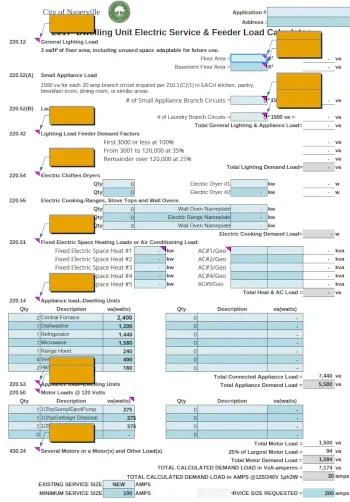
10/5-Year Warranty on All Work
Every job I do is covered by a 10-year warranty on all labor and workmanship, plus a 5-year warranty for parts installed.
Additionally, I always work with 100% satisfaction guaranteed. If there is anything you are unhappy with, I will fix it and make it right for you!
Services I Provide
- Ceiling Fan Installation and Replacement
- Exhaust & Bath Fan Installation and Replacement
- Surge Protectors
- Circuit Breakers
- Panels & Subpanels
- Appliance Outlets
- Meters & Services
- Receptacle Repair
- Switches
- Smoke Detectors
- Carbon Monoxide Detectors
- Wiring Upgrades
- Smart Doorbells
- Smart Home Devices
- Attic Fan Installation
